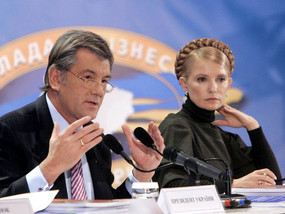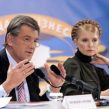
Yushchenko, Tymoshenko Pledge Reforms in Letter to IMF
Publication: Eurasia Daily Monitor Volume: 6 Issue: 42
By:

Ukrainian President Viktor Yushchenko and Prime Minister Yulia Tymoshenko have managed to set their differences aside and agree on a reform package in an effort to save the economy from imminent collapse. Yushchenko and Tymoshenko agreed on March 2 on the content of a letter of intent to the IMF signaling their readiness to take measures in the economy to qualify for the continuation of IMF financing in the framework of a $16.4 billion standby loan. Ukraine badly needs IMF money in order to avoid a default on its international obligations. The plan approved by Yushchenko and Tymoshenko may be blocked, however, by the opposition Party of Regions (PRU), which disagrees with several key provisions of the letter.
The IMF approved the standby loan for Ukraine last November. Its first $4.5 billion tranche arrived promptly for the National Bank (NBU) to start refinancing banks, several of which were about to collapse. Tymoshenko, however, intervened in the process. She told the NBU to coordinate refinancing with her cabinet, suspecting that banks were using the money for currency speculation; and she orchestrated a no-confidence vote in NBU chief and Yushchenko ally Volodymyr Stelmakh (see EDM, January 30). Tymoshenko also refused to revise the 2009 state budget, which both Yushchenko and the IMF viewed as too optimistic. Finance Minister Viktor Pynzenyk, who had refused to sign the budget, resigned in protest against what he described as the domination of politics over professionalism in the government (ICTV, February 28). Eventually, the IMF postponed the allocation of the loan’s $1.845 billion second tranche, which Ukraine expected on February 15. The IMF mission left Kyiv.
This was the last thing that an economy teetering on the brink of collapse needed. Ukraine has been the East European country most severely affected by the crisis. The national currency lost some 50 percent of its value from September 2008 to February. In January alone, inflation reached 2.9 percent, real wages dropped 12 percent, industrial output shrank 34.1 percent, and GDP contracted by some 20 percent compared with the previous year after almost a decade of steady growth that continued until last fall. The lack of unity between Yushchenko and Tymoshenko had been one of the reasons why Ukraine became one of the weakest links of the global economy in the face of the crisis. It is hard to see how Ukraine can survive without more international assistance, but complications with the IMF have been a very bad signal for all prospective lenders and investors.
The IMF has been reluctant to resume funding in the absence of coordinated efforts inside the country, so it came up with a condition that Yushchenko and Tymoshenko should sign a letter of intent pledging such cooperation. Yushchenko initially refused to sign any letters jointly with Tymoshenko, insisting that she should unconditionally cut the budget deficit from 3 percent to 1 percent as requested by the IMF (Ukrainska Pravda, February 23); but the IMF made it clear that a joint letter was an important condition for resuming cooperation. At the same time, it agreed that the budget deficit could be higher than 1 percent if Ukraine managed to borrow more abroad. The IMF also said that the NBU’s efforts to stabilize the banking sector should not be hampered by political interference (www.imf.org, February 27).
Yushchenko announced on February 27 that he had agreed on the following joint steps with Tymoshenko and parliament speaker Volodymyr Lytvyn: to draft a declaration pledging readiness to tackle the economic crisis jointly; to agree on a joint position on cooperation with the IMF; and to come up with a joint anti-crisis plan (UNIAN, February 27). Tymoshenko agreed not to insist on Stelmakh’s dismissal (Ekonomicheskie Izvestia, March 2).
Details of the agreement were finalized on March 2. Both sides made further concessions. Yushchenko agreed that the budget would be revised in April and May rather than immediately. Tymoshenko agreed to increase the price of gas for the public. She had opposed the step, apparently fearing it would make her less popular as a presidential candidate in 2010. They also agreed to promise the IMF to launch a pension reform, finance the budget deficit from external sources and higher taxes rather than by money emission, and to stabilize the national currency without significant intervention from the NBU so that the forex reserve would not be depleted (Segodnya, March 3). "Ukraine will without a doubt procure the second tranche from the IMF," Tymoshenko said, summing up the agreements. IMF Managing Director Dominique Strauss-Kahn told Yushchenko by phone that the chances for securing the second tranche would now be high (UNIAN, March 2).
Even if Tymoshenko and Yushchenko have resolved all their differences, the action plan promised to the IMF may be blocked in parliament, where the coalition that backs Tymoshenko does not control a majority. Disagreements have emerged even within the coalition as Lytvyn, whose party is the Tymoshenko bloc’s junior partner, has been reluctant to sign the letter to the IMF. The opposition vehemently objects to the plan. The Communists are against any accords with the IMF in principle, and the PRU indicated that it would oppose higher taxes, a higher gas price, and a pension reform that would raise the pension age from the current 60 years for men and 55 years for women (Ukrainska Pravda, March 2).




